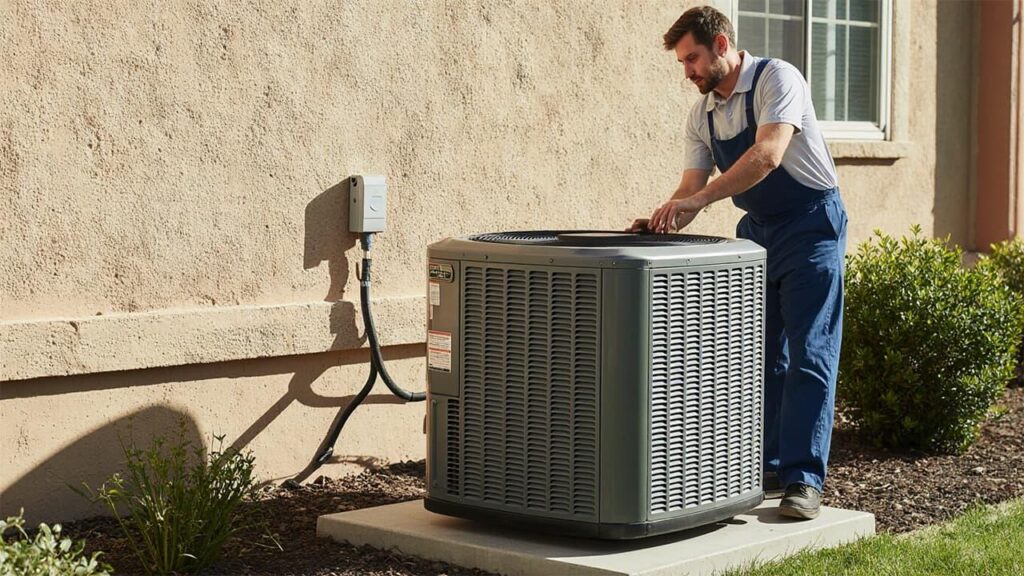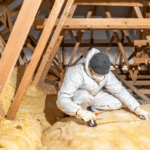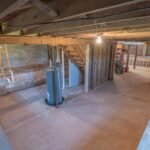If your HVAC system has been acting up lately—making strange noises, blowing lukewarm air, or just not keeping you comfortable—you’re probably asking the age-old question: Should I repair it, or is it finally time to replace it?
It’s a decision every homeowner eventually faces, and one that can feel overwhelming. After all, HVAC systems aren’t cheap, and neither is sweating through a Los Angeles summer while waiting on a fix. The good news? With a little guidance (and the right HVAC contractor in Los Angeles), you can make a smart, cost-effective decision based on facts—not guesswork.
In this article, we’ll break down the key signs, questions, and numbers to consider when choosing between HVAC repair and replacement.
1. Age Matters (But It’s Not the Whole Story)
As a rule of thumb, most HVAC systems last 10–15 years. Beyond that, even well-maintained systems tend to lose efficiency and require more frequent repairs. But age alone isn’t a reason to toss your system.
Ask yourself:
- Have you been consistent with HVAC maintenance services?
- Are your energy bills steadily rising?
- Does your system struggle to maintain temperature?
If your unit is over 12 years old and showing signs of decline, replacement may be the more economical route in the long run. However, if it’s relatively young and the issue is isolated (like a broken capacitor or thermostat), a targeted repair might be all you need.
Pro Tip: Check your warranty. Some components may still be covered, reducing the cost of repair.
2. The “$5,000 Rule” (Yes, It’s a Thing)
There’s a simple formula that many HVAC professionals use to weigh repair vs. replacement:
System Age × Repair Cost ≥ $5,000? Replace it.
Let’s say your system is 12 years old and the current repair will cost $500.
12 × $500 = $6,000. That’s over the threshold—time to start thinking about a new unit.
But if your unit is only 6 years old and the repair costs $300, then you’re well under that number. In that case, a repair makes much more financial sense.
This isn’t a hard rule, but it offers a helpful framework when you’re unsure what to do.
3. Frequency and Frustration: How Often Are You Calling for Repairs?
If you’ve had to schedule more than two or three HVAC repair visits in Los Angeles over the past year, that’s a red flag. Even if each individual repair seems “affordable,” those costs add up—financially and emotionally.
Here’s a handy comparison:
| Situation | Likely Recommendation |
|---|---|
| One-off breakdown in an otherwise healthy unit | Repair |
| Frequent minor repairs across different components | Replace |
| Major breakdown (e.g., compressor failure) in an older unit | Replace |
| Small repair on a newer, well-maintained unit | Repair |
Frequent issues might indicate deeper problems—like worn-out internal parts or system imbalances—that no single repair can truly fix.
4. Energy Efficiency and Your Monthly Bills
If your energy bill has slowly crept up (and you haven’t been blasting the AC any more than usual), your HVAC system might be the culprit.
Newer systems are significantly more efficient. A modern ENERGY STAR® certified unit can cut your energy costs by up to 20–40% compared to older models. So even if the upfront cost is higher, the savings over time can make a new system a smarter investment.
Also consider:
- Older systems often use R-22 refrigerant, which is now phased out and expensive to replenish.
- A new system may qualify for rebates or tax credits (especially if it’s energy efficient).
5. Comfort, Air Quality, and Peace of Mind
Sometimes, the real reason to replace your HVAC system isn’t financial—it’s functional. Maybe you’ve been dealing with uneven cooling, persistent humidity, or poor air quality. Perhaps your system is noisy or just never quite does the job anymore.
In Los Angeles, where summer heat can be relentless and wildfire season adds particles to the air, your HVAC system does more than heat and cool—it protects your indoor air quality and comfort.
If your system isn’t keeping up with your needs, and you’ve already tried repairs, replacing it might be the best way to improve your overall quality of life.
Repair or Replace? Use This Quick Checklist
Here’s a simplified guide to help you decide:
| Question | Answer | Recommendation |
|---|---|---|
| Is your HVAC system under 10 years old? | Yes | Repair (if the issue is minor) |
| Has your system needed multiple repairs recently? | Yes | Replace |
| Are your energy bills rising for no clear reason? | Yes | Replace |
| Is the repair minor and affordable (under $500)? | Yes | Repair |
| Is your system still using R-22 refrigerant? | Yes | Replace |
| Are you planning to move soon? | Yes | Repair (unless the system is a dealbreaker for resale) |
Bonus Insight: How HVAC Upgrades Affect Home Value
Planning to sell your home in the next few years? A new HVAC system can be a strong selling point, especially in a competitive LA market.
Buyers are wary of “big-ticket problems,” and a shiny new, energy-efficient HVAC system sends a clear message: This home is cared for.
Even if it doesn’t directly increase your home’s appraised value, it could help it sell faster—or at a better price.
Conclusion: Make the Smart Call for Your Home
Deciding whether to repair or replace your HVAC system doesn’t have to be stressful. With the right information—and an honest HVAC contractor in Los Angeles—you can weigh the facts, your budget, and your long-term comfort to make the best decision.
If your system’s still got some good years left, a fast HVAC repair in Los Angeles might do the trick. But if you’re constantly patching problems or paying too much in energy bills, investing in a new system could save you money (and headaches) down the line.
Whichever route you choose, just don’t ignore the signs. HVAC systems rarely fix themselves—and the sooner you act, the more control you’ll have over the cost, comfort, and outcome.






